Unit 1 Other countries other cultures Grammar and usage 课件(59张PPT)
文档属性
| 名称 | Unit 1 Other countries other cultures Grammar and usage 课件(59张PPT) | 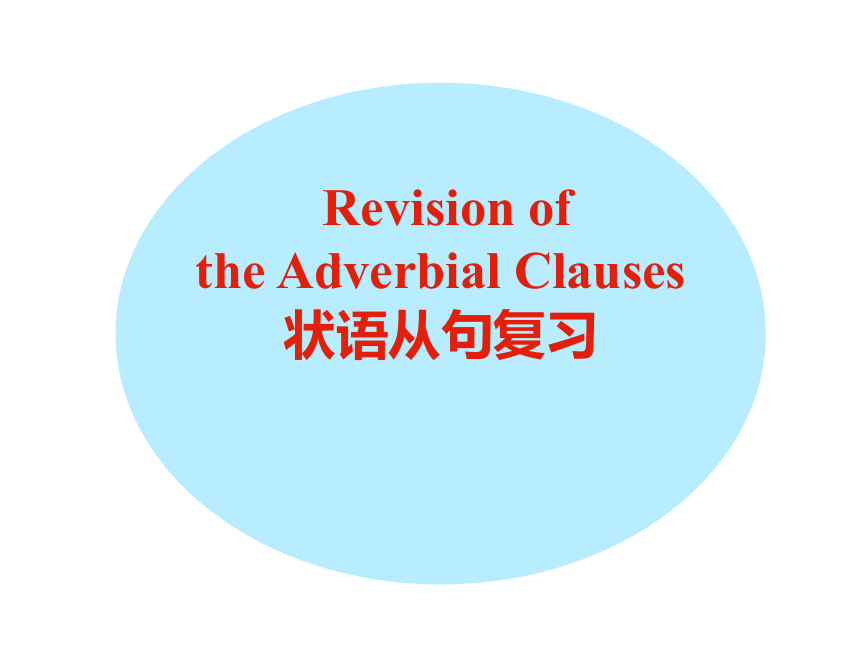 | |
| 格式 | zip | ||
| 文件大小 | 717.2KB | ||
| 资源类型 | 教案 | ||
| 版本资源 | 牛津译林版 | ||
| 科目 | 英语 | ||
| 更新时间 | 2020-03-02 10:16:46 | ||
图片预览


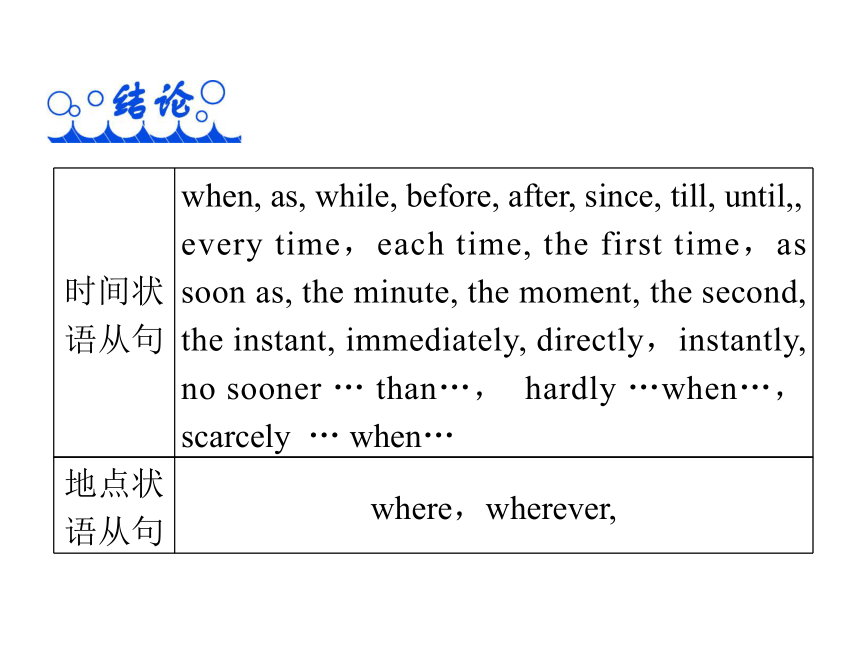
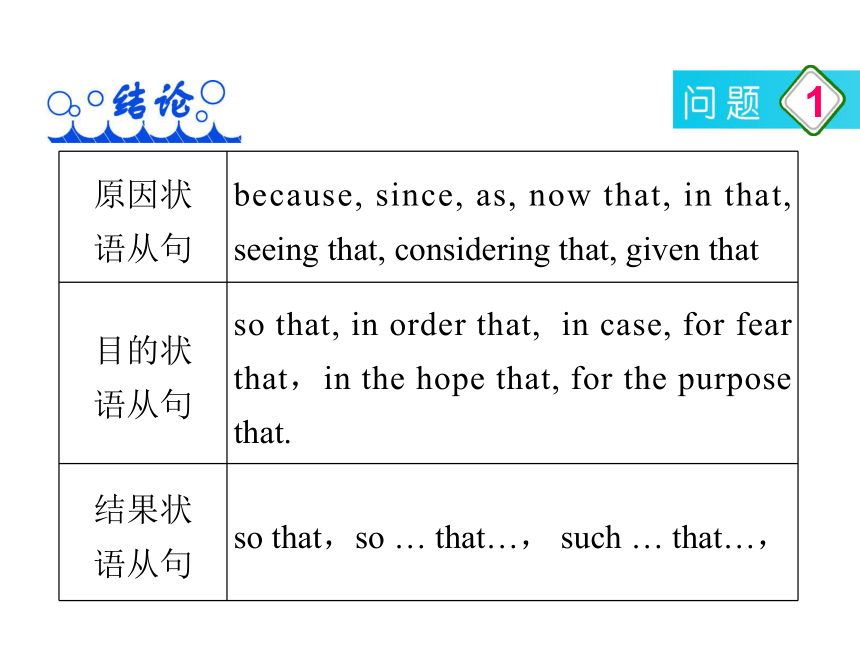
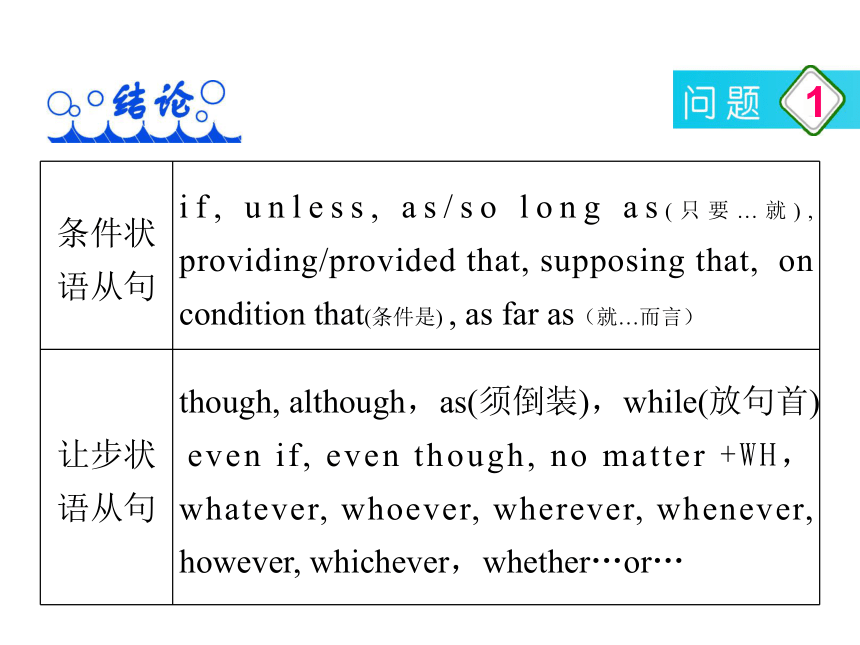
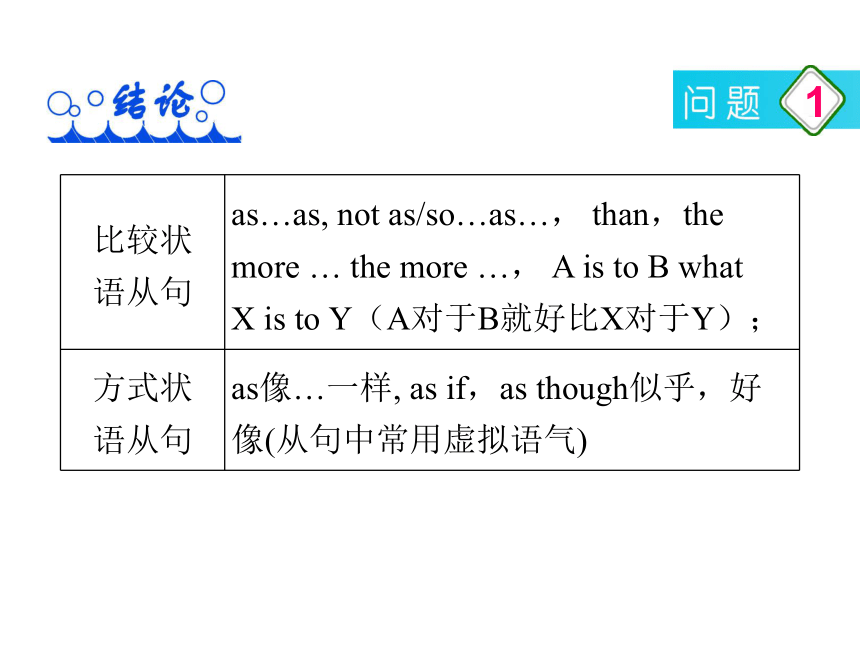

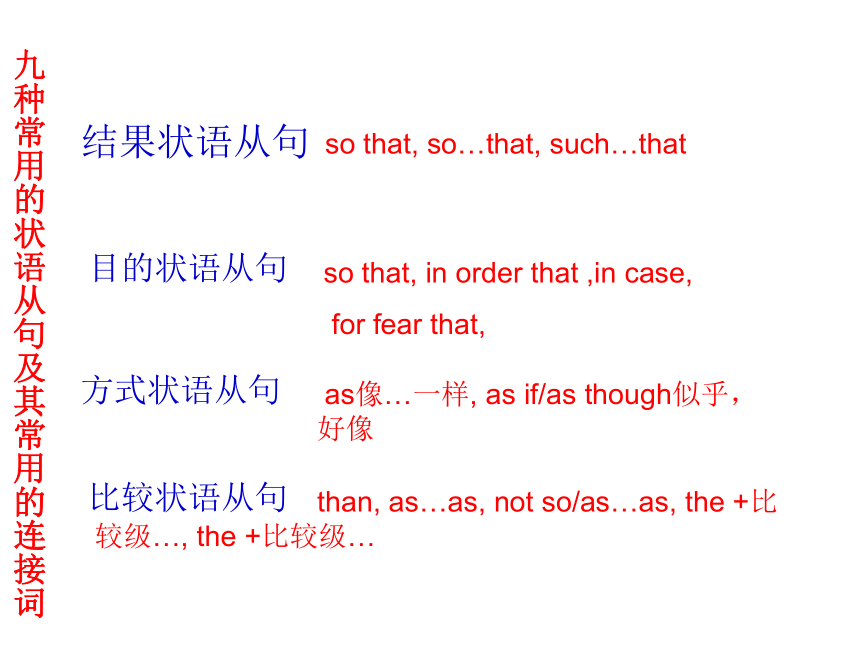

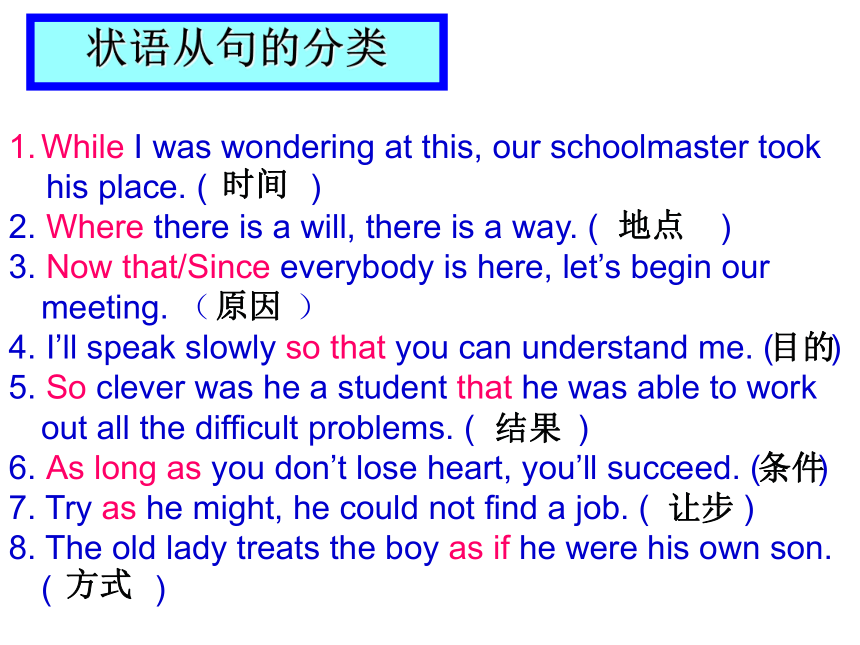

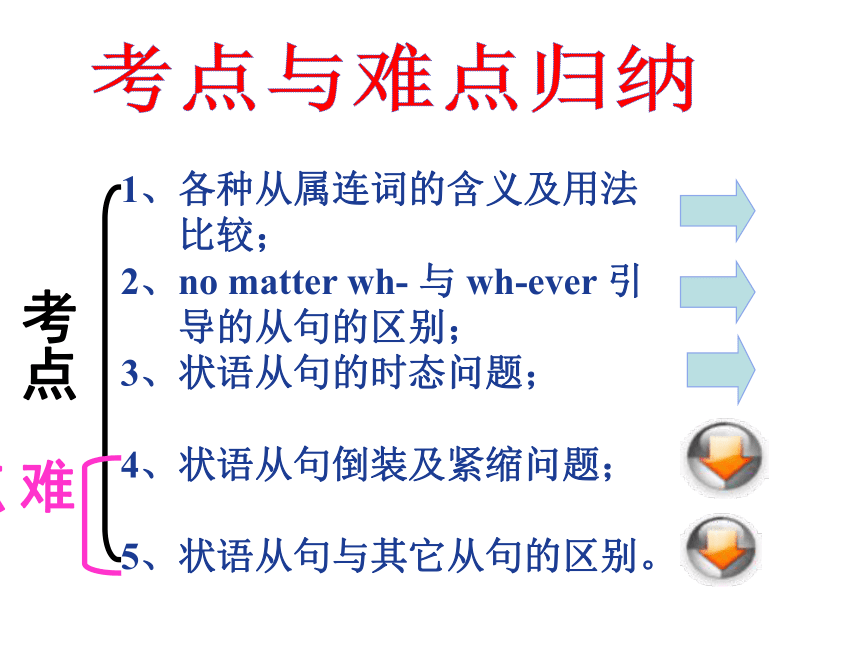
文档简介
(共59张PPT)
Revision of
the Adverbial Clauses
状语从句复习
九种常用的状语从句及其常用的连接词
时间状语从句
地点状语从句
原因状语从句
条件状语从句
让步状语从句
结果状语从句
目的状语从句
方式状语从句
比较状语从句
时间状
语从句 when, as, while, before, after, since, till, until,, every time,each time, the first time,as soon as, the minute, the moment, the second, the instant, immediately, directly,instantly, no sooner … than…, hardly …when…, scarcely … when…
地点状
语从句 where,wherever,
1
原因状
语从句 because, since, as, now that, in that, seeing that, considering that, given that
目的状
语从句 so that, in order that, in case, for fear that,in the hope that, for the purpose that.
结果状
语从句 so that,so … that…, such … that…,
1
条件状
语从句 if, unless, as/so long as(只要…就), providing/provided that, supposing that, on condition that(条件是) , as far as(就…而言)
让步状
语从句 though, although,as(须倒装),while(放句首)
even if, even though, no matter +WH,whatever, whoever, wherever, whenever, however, whichever,whether…or…
1
比较状
语从句 as…as, not as/so…as…, than,the more … the more …, A is to B what
X is to Y(A对于B就好比X对于Y);
方式状
语从句 as像…一样, as if,as though似乎,好像(从句中常用虚拟语气)
九种常用的状语从句及其常用的连接词
时间状语从句
when, while, as, before, after,till, until, not…until, the first/second…/last time, , as soon as, the moment, the minute, the instant, immediately, directly, instantly, hardly…when, scarcely…when, no sooner…than,each time,every time,whenever
where, wherever
because, since, as, now that, in that seeing that, considering that
if, unless, now (that), as(so) long as, in case, on condition that, suppose/supposing, provided/providing ,as/so far as
although, though, while, as, even though/if, no matter which/what/when/where/who/how, whichever, wherever, whatever, whenever, whoever, however, whether…or;
地点状语从句
原因状语从句
条件状语从句
让步状语从句
九种常用的状语从句及其常用的连接词
结果状语从句
so that, so…that, such…that
so that, in order that ,in case,
for fear that,
as像…一样, as if/as though似乎,好像
than, as…as, not so/as…as, the +比较级…, the +比较级…
目的状语从句
方式状语从句
比较状语从句
九种常用的状语从句
时间状语从句
地点状语从句
原因状语从句
条件状语从句
让步状语从句
结果状语从句
目的状语从句
方式状语从句
比较状语从句
状语从句有九种,
时地原因条状补,
目比结果方让步,
连词引导各不同;
主句通常前面走,
连词引导紧随后,
从句若在主前头,
主从之间有个逗。
While I was wondering at this, our schoolmaster took
his place. ( )
2. Where there is a will, there is a way. ( )
3. Now that/Since everybody is here, let’s begin our meeting. ( )
4. I’ll speak slowly so that you can understand me. ( )
5. So clever was he a student that he was able to work out all the difficult problems. ( )
6. As long as you don’t lose heart, you’ll succeed. ( )
7. Try as he might, he could not find a job. ( )
8. The old lady treats the boy as if he were his own son. ( )
时间
地点
原因
目的
结果
条件
让步
方式
状语从句的分类
考点与难点归纳
考点与难点归纳
1、各种从属连词的含义及用法
比较;
2、no matter wh- 与 wh-ever 引
导的从句的区别;
3、状语从句的时态问题;
4、状语从句倒装及紧缩问题;
5、状语从句与其它从句的区别。
考点
难点
1. 时间状语从句
问题1:
1. (北京高考) We were swimming in the lake ______ suddenly the
storm started.
A. when B. while C. until D. before
2. (上海) He was about to tell me the secret ______ someone
patted him on the shoulder.
A. as B. until C. while D. when
3. (上海) He transplanted the little tree to the garden ______ it
was the best time for it.
A. where B. when C. that D. until
4. (福建) -Did Jack come back early last night?
-Yes. It was not yet eight o’clock ____ he arrived home.
A. Before B. when C. that D. until
5. (辽宁) He was about halfway through his meal ______ a
familiar voice came to his ears.
A. why B. where C. when D. while
A
D
B
B
C
连接词when的用法小结
1. when引导的时间状语从句的谓语动词可以是可延续
的,也可以是表短暂性动作的动词,可用于主句和从句
动作同时发生或从句动作先于主句动作。如:
When the film ended, the people went back.
When I lived there, I used to go to the seashore on
Sundays.
2. 可用作并列连词,其意义为“那时,这时,突然”,相当于and at this/that time。常用于下列句式:
Somebody was doing something/was about to do
sth./was on the point of doing sth when… (刚要……就在这时突然……)
3. 还可以表示原因“既然”,相当于since; considering
that。如:
It was foolish of you to take a taxi when you could
easily walk there in five minutes .
问题2:
6. (天津) The cost of living in Glasgow is among the lowest in
Britain, ______ the quality of life is probably one of the highest.
A. since B. when C. as D. while
7. (14年江苏) ______ I accept that he is not perfect, I do actually
like the person.
A. While B. Since C. Before D. Unless
连接词while的用法小结
1. while引导的动作必须是持续性的,侧重主句动作和从句动作相对比。如:
Please don’t talk so loud while others are working.
2. while作为并列连词,意为“而,却”,表示对比。
3. while可表示尽管,相当于although。
D
A
连接词when, while, as的用法区别:
1.while引导的时间状语从句的谓语动词必须是可延续的,
而when引导的时间状语从句的谓语动词是可延续的,也
可以是表短暂性动作的动词。如:When/While he was
eating his breakfast, he heard the doorbell ring.
When I stopped my car, a man came up to me. (不可用
while)
2. as 强调主句和从句的动作同时发生。如:
As the election approached, the violence got worse.
问题3:
1. (北京春)-Did you remember to give Mary the
money you owed her?
-Yes. I gave it to her ______ I saw her.
A. while B. the moment
C. suddenly D. once
2. (上海高考) I thought her nice and honest ______ I
met her.
A. first time B. for the first time
C. the first time D. by the first time
3. ______ entered the office when he realized that
he had forgotten his report.
A. He hardly had B. Had he hardly
C. Hardly had he D. Hardly he had
B
C
C
小结:
1.一些词,如the moment, the minute, the instant,
immediately, directly, instantly, hardly…when,
scarcely…when, no sooner…than等也可引导一个时
间状语从句,相当于as soon as的意思。
I didn’t wait a moment, but came immediately you
called.
2.一些含有time的名词短语,如every time, each time,
next time, by the time等,以及the day, the year,
the morning等,也可引导一个时间状语从句。
The day he returned home, his father was already
dead.
Next time you come, please bring your composition.
3. 如果hardly或no sooner或scarcely置于句首,句子必
须用部分倒装结构,倒装部分用过去完成时。
Hardly had I got home when it began to rain.
问题4:
1. (北京春) -Was his father very strict with him when
he was at school?
-Yes. He had never praised him ______ he became
one of the top students in his grade.
A. after B. unless C. until D. when
2. (上海) A good storyteller must be able to hold
listeners’ curiosity ______ he reaches the end of the
story.
A. when B. unless C. after D. until
3. It was not ______ she took off her dark glasses
______ I realized she was a famous film star.
A. when; that B. until; that
C. until; when D. when; then
C
D
B
小结:
till, until和not…until:
1.until/till引导时间状语从句“某动作一直延续到某时间点才停“或“某动作直到某时间才开始”。
We waited until he came.
He won’t go to bed till/until she returns.
2.till不可以置于句首,而until可以。如:
Until you told me I had no idea of it.
3.not…until句型中的强调和倒装说法:
It was not until you told me that I had any idea of it.
Not until you told me did I have any idea of it.
问题5:
1. (北京) He made a mistake, but then he
corrected the situation ______ it got worse.
A. until B. when C. before D. as
2. (福建) Scientists say it may be five or six years
______ it is possible to test this medicine on
human patients.
A. since B. after C. before D. when
3. (四川)-Why didn’t you tell him about the
meeting?
-He rushed out of the room____I could say a
word.
A. before B. until C. when D. after
4. (北京春季) It is almost five years ______ we saw
each other last time.
A. before B. since C. after D. because
C
C
A
B
1)句型It will be/was+一段时间+before…
“还要过多久才……”
如:It will be two years before he leaves the country.
2)句型It will be/was not+一段时间+before…“不多久就……”
如: It wasn’t two years before he left the country.
3)句型It is+段时间+since…时间的计算一律从since从句的动作完成或状态结束时算起。如:
It is three years since she was in the army.
It is three years since she joined the army.
2、条件状语从句
问题1:
1、The WTO cannot live up to its name ____ it does not include
a country that is home to one fifth of mankind. (全国)
A.as long as B.while C.if D.even though
2、 It is known to all that _____ you exercise regularly, you
won’t keep good health. (重庆卷)
A. unless B. whenever C. although D. if
C
A
unless 相当于 if not,意思是“除非…”“如果不…就…”。这也是高考的热点之一。复习时也应给予高度重视。
问题2:
1、_____ I can see, there is only one possible way to keep
away from the danger. (北京春季)
A. As long as B. As far as C. Just as D. Even if
2、I always take something to read when I go to the
doctor’s ________ I have to wait. (全国卷3)
A.in case B.so that C.in order D.as if
B
A
as long as 与 as far as 都可引导条件状语从句,as long as 表示“只要…”,as far as 表示“就…而论(而言)”。题1根据题意应该选用B。in case 表示“以防”,根据题2的句意,不难作出选择。
3、让步状语从句
问题1:
1、 _____ I accept that he is not perfect, I do actually like the
person. (江苏)
A. While B. Since C. Before D. Unless
2、Allow children the space to voice their opinions, ____they
are different from your own. (湖南卷)
A. until B. even if C. unless D. as though
A
B
while 是高考中的高频词,它既可引导时间状语从句,又可引导并列句,还可引导让步状语从句,表示“尽管”。even if 等于 even though,表示“即使、尽管”。as though 等于 as if,引导方式状语从句,表示“好像、似乎”。
问题2:
1、 He tried his best to solve the problem, ___ difficult it was.
(天津卷)
A. however B. no matter C. whatever D although
2、The old tower must be saved, ______the cost. (浙江)
A.however B.whatever C.whichever D.wherever
A
B
no matter wh- 与 wh-ever 的联系及区别:
no matter wh- 只引导让步状语从句,此时与 wh-ever通用。
如: No matter when / Whenever he comes back, he should be invited to the party.
wh-ever又可引导名词性从句, No matter wh-不能。如:
Whatever I can do for you will be nothing but paying a debt. Whoever can help us will be welcome.
4. 状语从句的时态问题
问题1:
1、The house could fall down soon if no one______ some
quick repair work. (全国IV)
A has done B is doing C does D had done
2、It is almost five years _______ we saw each other last time.
(北京春季)
A. before B. since C. after D. when
在条件,时间和让步从句中,用一般现在时表示一般将
来时,用现在完成时表将来完成时,用一般过去时表过去将
来时。在 since 引导的时间状语从句中,动词一般都用一般
过去时,而主句常用现在完成时。
C
B
4、状语从句的倒装问题
问题1:
1、So difficult _____ it to live in an English-speaking country
that I determined to learn English. (上海)
A. I have felt B. have I felt C. I did feel D. did I feel
2、Not until all the fish died in the river _____ how serious the
pollution was. (全国卷)
A. did the villagers realize B. the villagers realized
C. the villagers did realize D. didn’t the villagers realize
状语从句的倒装一般有下面几种情况:① 否定词开头;
② so 加 adj. 开头;③ as / though引导的让步状语从句。
D
A
特别注意:
Hardly … when …
No sooner … than …
Child as he is, …
Hardly had he got to the station when the train left.
No sooner had he got to the station than the train left.
Child as he is, he can speak seven foreign languages.
5、状语从句与并列句的区别
问题1:
1、Though he is in his sixties, ______ he works as hard as a
young man
A. yet B. but C. and D. and yet
2、 Excuse me for breaking in, _________ I have some news
for you. (全国卷)
A. so B. and C. but D. yet
题1是主从复合句,所以中间不能使用并列连词 and; or;
but; so 等。yet 是副词,只有 yet 可以与 though 连用。题2为
并列句,而“Excuse …, but …”为一固定搭配。在复习中需要
细心的分析句子结构和成分。
A
C
根据句子意思选词(as, since, because)填空(每空一词)
1. It is __________ he is ill that he isn't here celebrating your birthday.
2. __________ you have known the truth from head to toe, I won't give any explanation.
3. __________ the weather is not so helpful, we had better prepare two plans in advance.
As
Since
because
6.As ,since, because 的区别
5
because语气最强,表示与结果直接相关的原因,可译为“(正/就是)因为”,所以常用于强调句型或回答why引导的问题。
since表示顺承关系,表达说话者认为合乎情理的逻辑推断,可译为“既然……(就……)”,此时用法上相当于now that。
5
as语气比较弱,常译为“由于”,强调原因时,有时可与because通用。
注意:for也可以表示原因,但它是并列连词,用法上注意两点: 不放句首(语气弱);引出补充说明的原因,不必直接翻译成“因为”。如:Come up to me, for I have something important to tell you.(过来,我有要事对你讲。)
根据句子意思选词(though, although, as, while)填空
1. __________ the Internet has so many conveniences, it also has a lot of inconveniences.
2. __________ the actress is beautiful, I don't like her.
3. Child __________ he is, he is the first Chinese to travel across Europe alone by bike.
6
让步状语从句的从属连词though, although,
as, while用法上有何区别?
答案
1. While / Though / Although
2. Though / Although/While
3. as/ though
根据句子意思选词(though, although, as, while)填空
6
让步状语从句的从属连词though, although,
as, while用法上有何区别?
6
表达让步含义时,常用从属连词though, although, as, while引导让步状语从句。while强调对比,只能放句首,以引出相对或相反的情况,译为“在……同时,却(有相反的情况) ”,此时可以用though或although替换。though既可放句首,也可放句末。as 引导让步状语从句必须倒装,此时可以用though替换。
7.For the first time 和 the first time
____________I saw you, I realized I seemed to have met you somewhere before.
This is _____________I've been here.
I have been here_______________.
the first time 常引导一个从句,
相当于as soon as
for the first time,第一次做某事, 不要加从句.常用现在完成时.
The first time
the first time
for the first time
8
状语从句中“一般式表将来”的含义是什么?
根据汉语提示,完成句子
1. 当你明天早上8点赶到机场时,我派车来接你。
__________at 8 o'clock tomorrow morning, I'll send a car to pick you up.
2. 妈妈说假如我在英语演讲比赛拿到一等奖,就送我出国深造。
Mum said _______ in the English Speaking Contest, I would be sent abroad to make further study.
3.I won't believe you until I have seen you with my own eyes.
8
状语从句中“一般式表将来”的含义是什么?
根据汉语提示,完成句子
答案
1. When you arrive at the airport
2. if I took the first place
在时间状语或条件状语从句中,时态上常用一般式表将来,“一般式表将来”包括三方面含义:一般现在时表一般将来时(见上述句1);一般过去时表过去将来时(见上述句2);现在完成时表将来完成时(见上述句3)。
8
对比训练与巩固
1 ① ______breaks the rule will be punished.
② ______breaks the rule, he or she will be punished.
③ ________break the rule will be punished.
A. Who B. No matter who
C. Whoever
D. Anyone E. Anyone who
F. Those G. Those who
C E
B C
G
2
① ____ is known to us all, paper was
first made in China.
② ____ is known to us all that paper
was first made in China.
③_____is known to us now is that he
hasn’t talked to Joan.
A. It B. Which
C. As D. What
A
C
D
3 ① The city is no longer the place _____ it used to be.
② The city is no longer _____it used to be.
A. that B. in which
C. what D. where
A
C
4 ①Plants of this kind grow best in
places ______it is neither hot nor
cold.
②Plants of this kind grow best
_______it is neither hot nor cold.
A. in which B. where
C. in there D. which
A B
B
6 ①It was 7 o’clock ______ he came back.
②It was at 7 o’clock ______ he came back.
③It was on the morning of May 1st
________ I met John at the airport.
④It was the morning of May 1st _______ I
met John at the airport.
A. that B. which C. when
D. on which E. at which
When he came back, it was 7 o’clock.
He came back at 7 o’clock.
C
C
A
A
5① It was in the house _________I met the young man.
A that B which
C where D in there
② It was in the small house ____was built with stones by his father __
he spent his childhood.
A.which; that B.that; where
C.which; which D.where; that
A
A
____ he heard this, he got very
angry.
2. I met Lucy____ I was walking
along the river.
3. ____ a child, he lived in the
countryside.
A. when B. while C. as
对比训练 1
A
B
C
1. We were about to leave____ it began to
rain.
2. She thought I was talking about her son,
____, in fact, I was talking about my son.
3. Hardly had I finished my composition
____ the bell rang.
A. when B. while C. as D. during
对比训练 2
A
B
A
1. Child ____ she is, she know a lot.
2. He did the experiment ____ he was told.
3. The pianos in the other shop will be
cheaper, but not ____ good.
A. during B. as C. so D. though
E. both B and C
对比训练 3
E
B
B
1. He would have a look at the bookstores
____ he went to town.
2. We decide to finish the work on time, ____
happens.
3. If we work with a strong will, we overcome
any difficulty, ____ great it is.
4. I’ll give the book to ____ likes English.
A. whenever B. whoever
C. whatever D. however
对比训练 4
A
C
D
B
对比训练 5
1. It will be years ____ we meet again.
2. It is ten years ____ I came to this town.
3. It is ten years ago ____ I came to this town.
A. when B. that C. before D. since
C
D
B
对比训练 6
D
B
A
1. ____ it rains, the game will be played on
time.
2. ____ I was twenty, I had never been away
from my hometown.
3. ____ he were there, he couldn’t help us.
A. Even if B. Until C. Till D. Unless
对比训练 7
Go and get your coat. It is ____ you left it.
2. You are free to go ____ you like.
A. there B. where
C. wherever D. when
B
C
对比训练 8
1. The article is written in such easy English
____ all of us can read it.
2. The article is written in such easy English
____ all of us can read.
A. that B. which C. as D. so that
A
C
A
对比训练 9
1. If we work hard, we can overcome any
difficulty, no matter ____ great it is.
2. If we work hard, we can overcome any
difficulty, ____ great it is.
3. If we work hard, we can overcome any
difficulty, ____ difficulty it is.
4. If we work hard, we can overcome any
difficulty, no matter ____ difficulty it is.
A. what B. how C. however D. whatever
B
C
D
A
语法填空:在空白处填入适当的连接词使从句完整
_1_ is known t o many of us, curiosity is an important quality_2_ not everyone believes it.
_3_ you are curious about something, your mind
keeps thinking new ideas, _4_ are related to it
_5_ you finally find the answer._6_you don’t have
curiosity, the ideas may pass by you _7_ nothing
had happened. Just think _8_ many great ideas
may have lost _9_ you don’t have curiosity. _10_
has curiosity, he or she is far from being bored.
参考答案
1. As 2. although/though 3. When/While
4. which 5. until/ till 6. if 7. as if
/ as though 8. how 9. because
10. Whoever / No matter who
Thank you!
Revision of
the Adverbial Clauses
状语从句复习
九种常用的状语从句及其常用的连接词
时间状语从句
地点状语从句
原因状语从句
条件状语从句
让步状语从句
结果状语从句
目的状语从句
方式状语从句
比较状语从句
时间状
语从句 when, as, while, before, after, since, till, until,, every time,each time, the first time,as soon as, the minute, the moment, the second, the instant, immediately, directly,instantly, no sooner … than…, hardly …when…, scarcely … when…
地点状
语从句 where,wherever,
1
原因状
语从句 because, since, as, now that, in that, seeing that, considering that, given that
目的状
语从句 so that, in order that, in case, for fear that,in the hope that, for the purpose that.
结果状
语从句 so that,so … that…, such … that…,
1
条件状
语从句 if, unless, as/so long as(只要…就), providing/provided that, supposing that, on condition that(条件是) , as far as(就…而言)
让步状
语从句 though, although,as(须倒装),while(放句首)
even if, even though, no matter +WH,whatever, whoever, wherever, whenever, however, whichever,whether…or…
1
比较状
语从句 as…as, not as/so…as…, than,the more … the more …, A is to B what
X is to Y(A对于B就好比X对于Y);
方式状
语从句 as像…一样, as if,as though似乎,好像(从句中常用虚拟语气)
九种常用的状语从句及其常用的连接词
时间状语从句
when, while, as, before, after,till, until, not…until, the first/second…/last time, , as soon as, the moment, the minute, the instant, immediately, directly, instantly, hardly…when, scarcely…when, no sooner…than,each time,every time,whenever
where, wherever
because, since, as, now that, in that seeing that, considering that
if, unless, now (that), as(so) long as, in case, on condition that, suppose/supposing, provided/providing ,as/so far as
although, though, while, as, even though/if, no matter which/what/when/where/who/how, whichever, wherever, whatever, whenever, whoever, however, whether…or;
地点状语从句
原因状语从句
条件状语从句
让步状语从句
九种常用的状语从句及其常用的连接词
结果状语从句
so that, so…that, such…that
so that, in order that ,in case,
for fear that,
as像…一样, as if/as though似乎,好像
than, as…as, not so/as…as, the +比较级…, the +比较级…
目的状语从句
方式状语从句
比较状语从句
九种常用的状语从句
时间状语从句
地点状语从句
原因状语从句
条件状语从句
让步状语从句
结果状语从句
目的状语从句
方式状语从句
比较状语从句
状语从句有九种,
时地原因条状补,
目比结果方让步,
连词引导各不同;
主句通常前面走,
连词引导紧随后,
从句若在主前头,
主从之间有个逗。
While I was wondering at this, our schoolmaster took
his place. ( )
2. Where there is a will, there is a way. ( )
3. Now that/Since everybody is here, let’s begin our meeting. ( )
4. I’ll speak slowly so that you can understand me. ( )
5. So clever was he a student that he was able to work out all the difficult problems. ( )
6. As long as you don’t lose heart, you’ll succeed. ( )
7. Try as he might, he could not find a job. ( )
8. The old lady treats the boy as if he were his own son. ( )
时间
地点
原因
目的
结果
条件
让步
方式
状语从句的分类
考点与难点归纳
考点与难点归纳
1、各种从属连词的含义及用法
比较;
2、no matter wh- 与 wh-ever 引
导的从句的区别;
3、状语从句的时态问题;
4、状语从句倒装及紧缩问题;
5、状语从句与其它从句的区别。
考点
难点
1. 时间状语从句
问题1:
1. (北京高考) We were swimming in the lake ______ suddenly the
storm started.
A. when B. while C. until D. before
2. (上海) He was about to tell me the secret ______ someone
patted him on the shoulder.
A. as B. until C. while D. when
3. (上海) He transplanted the little tree to the garden ______ it
was the best time for it.
A. where B. when C. that D. until
4. (福建) -Did Jack come back early last night?
-Yes. It was not yet eight o’clock ____ he arrived home.
A. Before B. when C. that D. until
5. (辽宁) He was about halfway through his meal ______ a
familiar voice came to his ears.
A. why B. where C. when D. while
A
D
B
B
C
连接词when的用法小结
1. when引导的时间状语从句的谓语动词可以是可延续
的,也可以是表短暂性动作的动词,可用于主句和从句
动作同时发生或从句动作先于主句动作。如:
When the film ended, the people went back.
When I lived there, I used to go to the seashore on
Sundays.
2. 可用作并列连词,其意义为“那时,这时,突然”,相当于and at this/that time。常用于下列句式:
Somebody was doing something/was about to do
sth./was on the point of doing sth when… (刚要……就在这时突然……)
3. 还可以表示原因“既然”,相当于since; considering
that。如:
It was foolish of you to take a taxi when you could
easily walk there in five minutes .
问题2:
6. (天津) The cost of living in Glasgow is among the lowest in
Britain, ______ the quality of life is probably one of the highest.
A. since B. when C. as D. while
7. (14年江苏) ______ I accept that he is not perfect, I do actually
like the person.
A. While B. Since C. Before D. Unless
连接词while的用法小结
1. while引导的动作必须是持续性的,侧重主句动作和从句动作相对比。如:
Please don’t talk so loud while others are working.
2. while作为并列连词,意为“而,却”,表示对比。
3. while可表示尽管,相当于although。
D
A
连接词when, while, as的用法区别:
1.while引导的时间状语从句的谓语动词必须是可延续的,
而when引导的时间状语从句的谓语动词是可延续的,也
可以是表短暂性动作的动词。如:When/While he was
eating his breakfast, he heard the doorbell ring.
When I stopped my car, a man came up to me. (不可用
while)
2. as 强调主句和从句的动作同时发生。如:
As the election approached, the violence got worse.
问题3:
1. (北京春)-Did you remember to give Mary the
money you owed her?
-Yes. I gave it to her ______ I saw her.
A. while B. the moment
C. suddenly D. once
2. (上海高考) I thought her nice and honest ______ I
met her.
A. first time B. for the first time
C. the first time D. by the first time
3. ______ entered the office when he realized that
he had forgotten his report.
A. He hardly had B. Had he hardly
C. Hardly had he D. Hardly he had
B
C
C
小结:
1.一些词,如the moment, the minute, the instant,
immediately, directly, instantly, hardly…when,
scarcely…when, no sooner…than等也可引导一个时
间状语从句,相当于as soon as的意思。
I didn’t wait a moment, but came immediately you
called.
2.一些含有time的名词短语,如every time, each time,
next time, by the time等,以及the day, the year,
the morning等,也可引导一个时间状语从句。
The day he returned home, his father was already
dead.
Next time you come, please bring your composition.
3. 如果hardly或no sooner或scarcely置于句首,句子必
须用部分倒装结构,倒装部分用过去完成时。
Hardly had I got home when it began to rain.
问题4:
1. (北京春) -Was his father very strict with him when
he was at school?
-Yes. He had never praised him ______ he became
one of the top students in his grade.
A. after B. unless C. until D. when
2. (上海) A good storyteller must be able to hold
listeners’ curiosity ______ he reaches the end of the
story.
A. when B. unless C. after D. until
3. It was not ______ she took off her dark glasses
______ I realized she was a famous film star.
A. when; that B. until; that
C. until; when D. when; then
C
D
B
小结:
till, until和not…until:
1.until/till引导时间状语从句“某动作一直延续到某时间点才停“或“某动作直到某时间才开始”。
We waited until he came.
He won’t go to bed till/until she returns.
2.till不可以置于句首,而until可以。如:
Until you told me I had no idea of it.
3.not…until句型中的强调和倒装说法:
It was not until you told me that I had any idea of it.
Not until you told me did I have any idea of it.
问题5:
1. (北京) He made a mistake, but then he
corrected the situation ______ it got worse.
A. until B. when C. before D. as
2. (福建) Scientists say it may be five or six years
______ it is possible to test this medicine on
human patients.
A. since B. after C. before D. when
3. (四川)-Why didn’t you tell him about the
meeting?
-He rushed out of the room____I could say a
word.
A. before B. until C. when D. after
4. (北京春季) It is almost five years ______ we saw
each other last time.
A. before B. since C. after D. because
C
C
A
B
1)句型It will be/was+一段时间+before…
“还要过多久才……”
如:It will be two years before he leaves the country.
2)句型It will be/was not+一段时间+before…“不多久就……”
如: It wasn’t two years before he left the country.
3)句型It is+段时间+since…时间的计算一律从since从句的动作完成或状态结束时算起。如:
It is three years since she was in the army.
It is three years since she joined the army.
2、条件状语从句
问题1:
1、The WTO cannot live up to its name ____ it does not include
a country that is home to one fifth of mankind. (全国)
A.as long as B.while C.if D.even though
2、 It is known to all that _____ you exercise regularly, you
won’t keep good health. (重庆卷)
A. unless B. whenever C. although D. if
C
A
unless 相当于 if not,意思是“除非…”“如果不…就…”。这也是高考的热点之一。复习时也应给予高度重视。
问题2:
1、_____ I can see, there is only one possible way to keep
away from the danger. (北京春季)
A. As long as B. As far as C. Just as D. Even if
2、I always take something to read when I go to the
doctor’s ________ I have to wait. (全国卷3)
A.in case B.so that C.in order D.as if
B
A
as long as 与 as far as 都可引导条件状语从句,as long as 表示“只要…”,as far as 表示“就…而论(而言)”。题1根据题意应该选用B。in case 表示“以防”,根据题2的句意,不难作出选择。
3、让步状语从句
问题1:
1、 _____ I accept that he is not perfect, I do actually like the
person. (江苏)
A. While B. Since C. Before D. Unless
2、Allow children the space to voice their opinions, ____they
are different from your own. (湖南卷)
A. until B. even if C. unless D. as though
A
B
while 是高考中的高频词,它既可引导时间状语从句,又可引导并列句,还可引导让步状语从句,表示“尽管”。even if 等于 even though,表示“即使、尽管”。as though 等于 as if,引导方式状语从句,表示“好像、似乎”。
问题2:
1、 He tried his best to solve the problem, ___ difficult it was.
(天津卷)
A. however B. no matter C. whatever D although
2、The old tower must be saved, ______the cost. (浙江)
A.however B.whatever C.whichever D.wherever
A
B
no matter wh- 与 wh-ever 的联系及区别:
no matter wh- 只引导让步状语从句,此时与 wh-ever通用。
如: No matter when / Whenever he comes back, he should be invited to the party.
wh-ever又可引导名词性从句, No matter wh-不能。如:
Whatever I can do for you will be nothing but paying a debt. Whoever can help us will be welcome.
4. 状语从句的时态问题
问题1:
1、The house could fall down soon if no one______ some
quick repair work. (全国IV)
A has done B is doing C does D had done
2、It is almost five years _______ we saw each other last time.
(北京春季)
A. before B. since C. after D. when
在条件,时间和让步从句中,用一般现在时表示一般将
来时,用现在完成时表将来完成时,用一般过去时表过去将
来时。在 since 引导的时间状语从句中,动词一般都用一般
过去时,而主句常用现在完成时。
C
B
4、状语从句的倒装问题
问题1:
1、So difficult _____ it to live in an English-speaking country
that I determined to learn English. (上海)
A. I have felt B. have I felt C. I did feel D. did I feel
2、Not until all the fish died in the river _____ how serious the
pollution was. (全国卷)
A. did the villagers realize B. the villagers realized
C. the villagers did realize D. didn’t the villagers realize
状语从句的倒装一般有下面几种情况:① 否定词开头;
② so 加 adj. 开头;③ as / though引导的让步状语从句。
D
A
特别注意:
Hardly … when …
No sooner … than …
Child as he is, …
Hardly had he got to the station when the train left.
No sooner had he got to the station than the train left.
Child as he is, he can speak seven foreign languages.
5、状语从句与并列句的区别
问题1:
1、Though he is in his sixties, ______ he works as hard as a
young man
A. yet B. but C. and D. and yet
2、 Excuse me for breaking in, _________ I have some news
for you. (全国卷)
A. so B. and C. but D. yet
题1是主从复合句,所以中间不能使用并列连词 and; or;
but; so 等。yet 是副词,只有 yet 可以与 though 连用。题2为
并列句,而“Excuse …, but …”为一固定搭配。在复习中需要
细心的分析句子结构和成分。
A
C
根据句子意思选词(as, since, because)填空(每空一词)
1. It is __________ he is ill that he isn't here celebrating your birthday.
2. __________ you have known the truth from head to toe, I won't give any explanation.
3. __________ the weather is not so helpful, we had better prepare two plans in advance.
As
Since
because
6.As ,since, because 的区别
5
because语气最强,表示与结果直接相关的原因,可译为“(正/就是)因为”,所以常用于强调句型或回答why引导的问题。
since表示顺承关系,表达说话者认为合乎情理的逻辑推断,可译为“既然……(就……)”,此时用法上相当于now that。
5
as语气比较弱,常译为“由于”,强调原因时,有时可与because通用。
注意:for也可以表示原因,但它是并列连词,用法上注意两点: 不放句首(语气弱);引出补充说明的原因,不必直接翻译成“因为”。如:Come up to me, for I have something important to tell you.(过来,我有要事对你讲。)
根据句子意思选词(though, although, as, while)填空
1. __________ the Internet has so many conveniences, it also has a lot of inconveniences.
2. __________ the actress is beautiful, I don't like her.
3. Child __________ he is, he is the first Chinese to travel across Europe alone by bike.
6
让步状语从句的从属连词though, although,
as, while用法上有何区别?
答案
1. While / Though / Although
2. Though / Although/While
3. as/ though
根据句子意思选词(though, although, as, while)填空
6
让步状语从句的从属连词though, although,
as, while用法上有何区别?
6
表达让步含义时,常用从属连词though, although, as, while引导让步状语从句。while强调对比,只能放句首,以引出相对或相反的情况,译为“在……同时,却(有相反的情况) ”,此时可以用though或although替换。though既可放句首,也可放句末。as 引导让步状语从句必须倒装,此时可以用though替换。
7.For the first time 和 the first time
____________I saw you, I realized I seemed to have met you somewhere before.
This is _____________I've been here.
I have been here_______________.
the first time 常引导一个从句,
相当于as soon as
for the first time,第一次做某事, 不要加从句.常用现在完成时.
The first time
the first time
for the first time
8
状语从句中“一般式表将来”的含义是什么?
根据汉语提示,完成句子
1. 当你明天早上8点赶到机场时,我派车来接你。
__________at 8 o'clock tomorrow morning, I'll send a car to pick you up.
2. 妈妈说假如我在英语演讲比赛拿到一等奖,就送我出国深造。
Mum said _______ in the English Speaking Contest, I would be sent abroad to make further study.
3.I won't believe you until I have seen you with my own eyes.
8
状语从句中“一般式表将来”的含义是什么?
根据汉语提示,完成句子
答案
1. When you arrive at the airport
2. if I took the first place
在时间状语或条件状语从句中,时态上常用一般式表将来,“一般式表将来”包括三方面含义:一般现在时表一般将来时(见上述句1);一般过去时表过去将来时(见上述句2);现在完成时表将来完成时(见上述句3)。
8
对比训练与巩固
1 ① ______breaks the rule will be punished.
② ______breaks the rule, he or she will be punished.
③ ________break the rule will be punished.
A. Who B. No matter who
C. Whoever
D. Anyone E. Anyone who
F. Those G. Those who
C E
B C
G
2
① ____ is known to us all, paper was
first made in China.
② ____ is known to us all that paper
was first made in China.
③_____is known to us now is that he
hasn’t talked to Joan.
A. It B. Which
C. As D. What
A
C
D
3 ① The city is no longer the place _____ it used to be.
② The city is no longer _____it used to be.
A. that B. in which
C. what D. where
A
C
4 ①Plants of this kind grow best in
places ______it is neither hot nor
cold.
②Plants of this kind grow best
_______it is neither hot nor cold.
A. in which B. where
C. in there D. which
A B
B
6 ①It was 7 o’clock ______ he came back.
②It was at 7 o’clock ______ he came back.
③It was on the morning of May 1st
________ I met John at the airport.
④It was the morning of May 1st _______ I
met John at the airport.
A. that B. which C. when
D. on which E. at which
When he came back, it was 7 o’clock.
He came back at 7 o’clock.
C
C
A
A
5① It was in the house _________I met the young man.
A that B which
C where D in there
② It was in the small house ____was built with stones by his father __
he spent his childhood.
A.which; that B.that; where
C.which; which D.where; that
A
A
____ he heard this, he got very
angry.
2. I met Lucy____ I was walking
along the river.
3. ____ a child, he lived in the
countryside.
A. when B. while C. as
对比训练 1
A
B
C
1. We were about to leave____ it began to
rain.
2. She thought I was talking about her son,
____, in fact, I was talking about my son.
3. Hardly had I finished my composition
____ the bell rang.
A. when B. while C. as D. during
对比训练 2
A
B
A
1. Child ____ she is, she know a lot.
2. He did the experiment ____ he was told.
3. The pianos in the other shop will be
cheaper, but not ____ good.
A. during B. as C. so D. though
E. both B and C
对比训练 3
E
B
B
1. He would have a look at the bookstores
____ he went to town.
2. We decide to finish the work on time, ____
happens.
3. If we work with a strong will, we overcome
any difficulty, ____ great it is.
4. I’ll give the book to ____ likes English.
A. whenever B. whoever
C. whatever D. however
对比训练 4
A
C
D
B
对比训练 5
1. It will be years ____ we meet again.
2. It is ten years ____ I came to this town.
3. It is ten years ago ____ I came to this town.
A. when B. that C. before D. since
C
D
B
对比训练 6
D
B
A
1. ____ it rains, the game will be played on
time.
2. ____ I was twenty, I had never been away
from my hometown.
3. ____ he were there, he couldn’t help us.
A. Even if B. Until C. Till D. Unless
对比训练 7
Go and get your coat. It is ____ you left it.
2. You are free to go ____ you like.
A. there B. where
C. wherever D. when
B
C
对比训练 8
1. The article is written in such easy English
____ all of us can read it.
2. The article is written in such easy English
____ all of us can read.
A. that B. which C. as D. so that
A
C
A
对比训练 9
1. If we work hard, we can overcome any
difficulty, no matter ____ great it is.
2. If we work hard, we can overcome any
difficulty, ____ great it is.
3. If we work hard, we can overcome any
difficulty, ____ difficulty it is.
4. If we work hard, we can overcome any
difficulty, no matter ____ difficulty it is.
A. what B. how C. however D. whatever
B
C
D
A
语法填空:在空白处填入适当的连接词使从句完整
_1_ is known t o many of us, curiosity is an important quality_2_ not everyone believes it.
_3_ you are curious about something, your mind
keeps thinking new ideas, _4_ are related to it
_5_ you finally find the answer._6_you don’t have
curiosity, the ideas may pass by you _7_ nothing
had happened. Just think _8_ many great ideas
may have lost _9_ you don’t have curiosity. _10_
has curiosity, he or she is far from being bored.
参考答案
1. As 2. although/though 3. When/While
4. which 5. until/ till 6. if 7. as if
/ as though 8. how 9. because
10. Whoever / No matter who
Thank you!
同课章节目录
- 模块9
- Unit 1 Other countries, other cultures
- Unit 2 Witnessing time
- Unit 3 The meaning of colou
- Unit 4 Behind beliefs
- 模块10
- unit 1 building the future
- unit 2 people on the move
- unit 3 protecting ourselves
- unit 4 law and orde
- 模块11
- unit 1 careers and skills
- unit 2 getting a job
- unit 3 the secret of success
- unit 4 the next step
